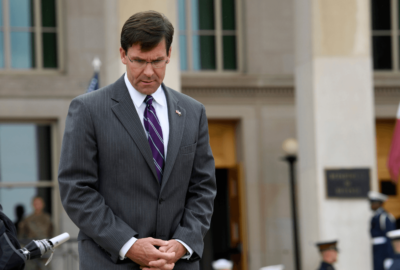

Twenty-five watchdog groups want Congress to considering clamping down on defense contractors.
Twenty-five government watchdog organizations are urging Congress to clean up the Defense Department in its most recent defense authorization bill.
The letter, — obtained by Federal News Network and signed by the Project on Government Oversight (POGO), Public Citizen and Citizens for Responsibility and Ethics in Washington and others – advocates for a handful of amendments to the House version of 2020 defense authorization bill.
The House Rules Committee will rule Tuesday on which of the nearly 700 proposed amendments are to be debated on the floor or wrapped into the bill by unanimous consent.
The letter comes as DoD is trying to wrangle its own ethics issues surrounding the presumptive nominee for defense secretary.
“The American people should have confidence that national security officials are making decisions based on what’s best for the national defense of the country,” The letter, drafted by POGO, stated. “Unfortunately, our current system allows private interests to be put ahead of protecting national interests. Most voters support reforms like these and have a right to know who is seeking to influence the Pentagon — whether they’re foreign governments or big defense contractors. That’s why Congress should take concrete steps now to clean up Washington by passing these commonsense ethics reforms for the Pentagon.”
One amendment, proposed by House Armed Services Personnel Subcommittee Chairwoman Jackie Speier (D-Calif.) would require DoD to maintain a database of defense officials who leave to work for defense contractors.
Another amendment from Rep. Jan Schakowsky (D-Ill.) would increase disclosure from defense contractors about the contacts between their employees and the Pentagon.
Schakowsky’s amendment is inspired by the fact that 52 contractors employ nearly 2,500 former DoD acquisition officials.
Rep. Dean Phillips (D-Minn.) introduced an amendment closing loopholes in the existing “cool-off” periods that prevent government officials from going to contractors they worked with while in the Pentagon.
Currently, senior Air Force acquisition officials can award contracts to a defense contractor and then join that same company without a cooling-off period, as long as they don’t go to the specific division within the company that received the contract.
Phillips’ amendment would put an end to that, and prevent former contractor employees from overseeing their former employer after becoming a federal official.
The amendment goes further in requiring contractors to certify ethics compliance of former DoD senior officials and flag officers that they employ.
“These reforms are practical, not political. We urge both democrats and republicans to set aside partisan politics and stand up for a more ethical and effective national defense now,” the letter states.
While the letter addresses many contractor issues, DoD is dealing with some internal issues regarding its top position.
The White House and Congress have until July 30 to confirm a new defense secretary or the Pentagon will be in breach of the Vacancies Act. The position will then have been vacant of a confirmed official for 210 days, the maximum allowed under the act without the Senate rejecting a potential nominee.
That means the White House and Senate have 12 legislative days to confirm a new secretary.
Army Secretary Mark Esper is currently acting defense secretary, however, there are a few hoops he must jump through to be confirmed.
First, the White House still has not officially nominated Esper. If Esper is nominated, he will have to step down from his acting position while under consideration.
Another hurdle Esper must face is Senate concerns about his dealings with Raytheon. Esper was a lobbyist for Raytheon before joining the Trump administration. He sold his stock in 2018. However, Esper is still entitled to at least $1 million in deferred compensation after 2022, according to his agreement with the Office of Government Ethics.
Bloomberg first reported Tuesday that Esper is proposing new exceptions to his pledge to recuse himself from decisions involving Raytheon. Those exceptions include situations where a DoD official and an ethics officer deem Esper’s participation in a decision regarding Raytheon is so important that it connect be referred to another official, according to the article.
Those exceptions likely signal that the White House is preparing to nominate him.
If the Pentagon violates the Vacancies Act then Esper will be forced to step down from his acting role.
Copyright © 2024 Federal News Network. All rights reserved. This website is not intended for users located within the European Economic Area.
Scott Maucione is a defense reporter for Federal News Network and reports on human capital, workforce and the Defense Department at-large.
Follow @smaucioneWFED
